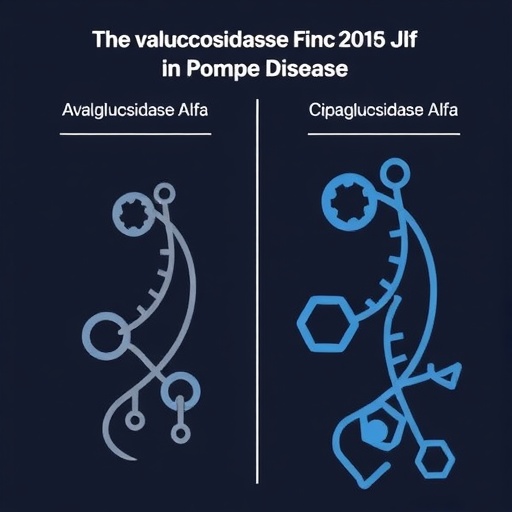A recent study published in the journal “Advances in Therapy” has ignited a discussion in the medical community about the treatment options available for patients suffering from late-onset Pompe disease. This rare and debilitating genetic disorder is characterized by the accumulation of glycogen in the body’s cells due to a deficiency in the enzyme acid alpha-glucosidase. In this groundbreaking study, researchers explored the efficacy of two prominent treatment options—avalglucosidase alfa and the combination of cipaglucosidase alfa with miglustat—shedding new light on their comparative effects on patient outcomes.
The study, led by a team of researchers including Roberts, Proskorovsky, and Guyot, employs an indirect treatment comparison method to evaluate the performance of these two therapies. This method allows for a systematic assessment of the data available from multiple clinical trials, circumventing the need for head-to-head comparisons. Given the complexities associated with rare diseases like Pompe disease, which often have limited patient populations for clinical trials, this approach offers a pragmatic solution for drawing conclusions from existing research.
The findings of the study indicate that both treatment regimens have their unique advantages and considerations. Avalglucosidase alfa, a newer enzyme replacement therapy, has been touted for its ability to deliver greater increases in muscle function and respiratory outcomes compared to traditional therapies. On the other hand, the combination therapy of cipaglucosidase alfa and miglustat has shown promise in terms of metabolic modulation, potentially providing a broader range of benefits, particularly for patients with more advanced disease stages.
Importantly, the research highlights the challenges faced by healthcare practitioners in utilizing these therapies effectively. Patient management in Pompe disease requires not only the administration of pharmacological agents but also a comprehensive approach that takes into account the overall health and well-being of patients. The findings reinforce the need for personalized treatment strategies that are carefully tailored to each patient’s unique condition and progression of the disease.
Notably, the study emphasizes the importance of assessing long-term outcomes when considering treatment options. While short-term efficacy is crucial, the long-term implications of chronic treatment must not be overlooked. The need for ongoing monitoring and assessment of patient response emphasizes a more holistic view of care in managing chronic conditions.
Emphasis is also placed on the potential for emerging biomarkers that could guide treatment decisions and enable better prognostic assessments. The identification of such markers could pave the way for more effective monitoring of treatment responses and adjustment of therapeutic strategies over time. This aspect of the research underscores the importance of continuous innovation in the field of genetic medications.
The broader context of this research speaks to the growing recognition of Pompe disease within the medical community. As advocacy for rare diseases gains traction, there is an increasing urgency to understand the complex interactions between genetic disorders and the treatments available. This study serves as a pivotal contribution to the literature, helping to frame the ongoing dialogue in the development of effective treatment modalities.
Despite the advancements made in recent years, the quest for optimal therapies for rare diseases remains fraught with hurdles. Many patients and families still encounter challenges in accessing the necessary treatments due to high costs, geographical limitations, and a lack of awareness among healthcare providers. The disparities in treatment availability highlight the pressing need for increased funding, support, and research dedicated specifically to rare diseases like Pompe.
Furthermore, the study advocates for interdisciplinary collaboration among clinicians, researchers, and patient organizations. The complexity of diseases like Pompe necessitates collective efforts to share knowledge, resources, and innovative treatment ideas. The potential for collaboration extends beyond individual patient care, touching on broader research initiatives that could ultimately lead to improved therapeutic strategies for not only Pompe disease but other rare genetic disorders.
As this research garners attention, it could catalyze further investigations into both the efficacy of current therapies and the development of novel treatment strategies. The ripple effect of such studies can significantly impact patient lives, offering hope to those navigating the challenges associated with late-onset Pompe disease. The road ahead is undoubtedly challenging, but with continued research and innovation, the prospects for improved patient outcomes remain promising.
In a broader perspective, the study reflects a shift in how the medical community views therapeutic options for genetic disorders. With each new research endeavor, the understanding of these complex conditions deepens, paving the way for advancements that could potentially revolutionize patient care. The impact of such studies reverberates beyond immediate clinical settings, influencing policy decisions, funding allocations, and the trajectory of future genetic research.
In conclusion, this recent comparative analysis of avalglucosidase alfa and cipaglucosidase alfa plus miglustat constitutes a crucial step in enhancing our understanding of treatment options for late-onset Pompe disease. The efforts of the research team bring to light the critical need for sustained focus on rare genetic disorders, where effective therapies can dramatically improve quality of life. As the conversation surrounding these treatment modalities continues, the hope is that future inquiries will lead to even more compelling insights, ultimately ensuring that patients receive the best possible care.
Subject of Research: Indirect Treatment Comparison of Avalglucosidase Alfa versus Cipaglucosidase Alfa Plus Miglustat in Patients with Late-Onset Pompe Disease
Article Title: An Indirect Treatment Comparison of Avalglucosidase Alfa versus Cipaglucosidase Alfa Plus Miglustat in Patients with Late-Onset Pompe Disease
Article References: Roberts, M.E., Proskorovsky, I., Guyot, P. et al. An Indirect Treatment Comparison of Avalglucosidase Alfa versus Cipaglucosidase Alfa Plus Miglustat in Patients with Late-Onset Pompe Disease. Adv Ther (2025). https://doi.org/10.1007/s12325-025-03301-9
Image Credits: AI Generated
DOI: 10.1007/s12325-025-03301-9
Keywords: Late-Onset Pompe Disease, Avalglucosidase Alfa, Cipaglucosidase Alfa, Miglustat, Treatment Comparison, Enzyme Replacement Therapy.




